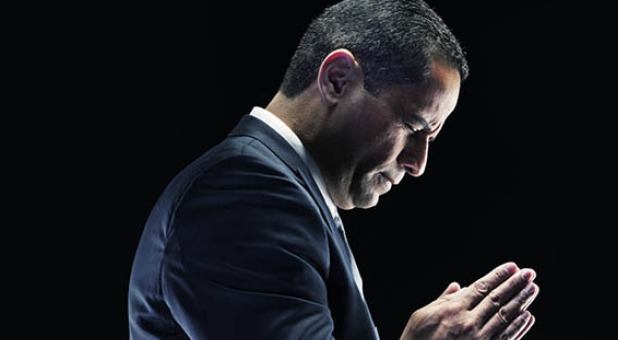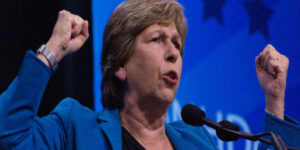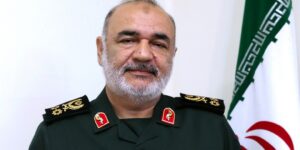Wilfredo De Jesús: The New Face of Social Justice
Wilfredo De Jesús was there in Humboldt Park in the 1970s when riots broke out protesting police brutality and prejudice. For three, long bloody days, gangs roamed the streets rioting and looting and police shot at citizens. Eventually the National Guard was called in. The community had become a war zone. And De Jesús, on the verge of adolescence and the son of a single mom in the Hispanic community of Humboldt, got caught up in it.
On the second day of the riots, the 12-year-old De Jesús took a soda from a store and ran. Before he got too far, he stopped, confused and conflicted. He returned the soda and wondered what had compelled him to make such a choice in the midst of chaos.
It’s a moment De Jesús, now 48 and featured on the cover of TIME magazine as a pastor and leader of the social justice movement among global Latino Christians, who call themselves “Evangélicos,” points to as a major turning point in his life.
“When you live in the inner city, it shapes you because you see the injustice and you can’t just preach on Sunday and then ignore it like it doesn’t happen,” he says. “You have no other choice but to jump in the middle of that fight and speak for people.
“I’m really humbled to represent the Christian Latino community,” De Jesús continues. “I now bear a responsibility for that image and what it represents for millions of Hispanics around our nation and the world, that they would see that and feel proud. I’m humbled by it, but I also understand that with revelation comes responsibility.”
“Revelation,” as De Jesús describes it, came for him when he participated in a summer youth work program pioneered by Chicago Mayor Richard J. Daley. De Jesús signed up believing he would be asked to clean the streets. Instead he was assigned to an Assemblies of God church to do maintenance work for a youth day camp.
At this camp, he saw kids who were different—they weren’t in gangs like his brothers. Their friendship offered him an alternative to the welfare existence he knew. De Jesús had a spiritual experience in that church at the end of the summer that would forever change him.
“I was raised in a dysfunctional family,” he says. “My father was an alcoholic and abandoned us when I was 8 years old. Everything in life was against me: dysfunctional family, failed at third grade, couldn’t read, had no father figure, surrounded by gangs and drugs. Yet God in his infinite wisdom chose my life.”
De Jesús now pastors that same church, called New Life Covenant, and has seen it grow into the largest Assemblies of God church in the nation. De Jesús says it’s because he’s a local—because he grew up there and had those experiences as a child in Humboldt Park and with his family that makes him the right pastor for the church. “I think that’s why the community has embraced me and said, ‘Hey he’s our pastor. Even if we don’t go to his church, he speaks for us.’”
New Life now has 17,000 through four church campuses and boasts more than 130 ministries reaching the most destitute—the homeless, prostitutes, drug addicts and gang members. These multi-faceted development programs offer everything from food and clothing pantries, to transitional shelters, residential recovery and job training programs, mobile soup kitchens for the homeless and shut-ins, gang and at risk youth intervention, human trafficking advocacy, world missions and humanitarian relief, after school tutoring and sports programming, mentoring, prison outreach and immigration advocacy.
“[These] ministries connect with broken people,” De Jesús says. “We’re constantly trying to fish for souls.” He also points to Hope Fest, an event being held on July 27 in Chicago, and supported by a generous grant from Joyce Meyer Ministries, as another example of reaching out to the least of these. At the event, which Meyer herself will host, New Life will give more than 6,000 school bags to students from 15 different schools in the community. “Growing up as a kid of a single mom, my mom didn’t have the resources,” De Jesús says. “I make it a point to make sure every kid starts with a haircut, a brand new uniform and book bag.”
Throughout his ministry career, De Jesús, affectionately known by his nickname “Pastor Choco,” has kept his pulse on the local community, where he lives with his wife Elizabeth and their three children, Alexandria, Yesenia and Wilfredo, Jr.
“It’s only right that where God took me out of, I would go back to,” he says. “As a matter of fact I built my home in the same community of the 70s, where my wife and three kids live. I could have built anywhere, in the suburbs or away from the city, away from the crime, but I am compelled, provoked by the Holy Spirit, to minister to ‘the least of these.’ There is no doubt I have this connection with the poor and less fortunate.”
De Jesús’ advocacy to people in need extends past the walls of the church and into local politics. From 1998 to 2000, De Jesús held two positions, one as Assistant Pastor and the other as the Executive Assistant to the CEO of the Chicago Public Schools. From 2004 – 2010, De Jesús served as a commissioner on the Chicago Zoning Board of Appeals. When Mayor Richard M. Daley, son of the mayor whose work program De Jesús signed up for as a youth, didn’t seek re-election, De Jesús ran for the office until withdrawing a month before the election to endorse another candidate.
Over the years while holding ministry positions, De Jesús also received a bachelor’s degree in communications from Trinity University and a master’s degree in Christian ministries from North Park Theological Seminary.
De Jesús reflects the new face of the Pentecostal movement – young and ethnically diverse. He’s the vice president of social justice for the nation’s largest Hispanic Christian organization, The National Hispanic Christian Leadership Conference, which serves 40,000 churches and close to 15 million born-again Christians.
Among his denomination, the Assemblies of God, Hispanics comprise 21.5 percent of adherents, according to the Office of the General Secretary. At a time when church attendance in America is falling rapidly, AG numbers have risen every year for 22 years—with 39 percent growth in adherents since 1990—and most of that growth has come from those under 40 and from minorities. In 2011, 40.4 percent of the AG’s constituents were minority (up from 29.4 percent in 2001). In those 10 years (2001-2011), the largest amount of growth among major race/ethnic groups took place among Hispanics.
De Jesús believes these are formidable numbers that can’t be ignored. “You have the Hispanic community, over 51 million in the United States,” he says, a number verified by a 2013 report from the Pew Research Hispanic Center. “With that you have evangelical Hispanics who are also [an] up-and-coming force to be reckoned with at every level. We’re not just crazy ‘Hallelujah people.’ We’re people God has chosen to govern, to lead communities and cities with conviction, unapologetically.”
The time is ripe for the Hispanic community to stand up to injustice, De Jesús believes, but not by rioting, as he experienced in his youth. “I believe what the Bible says—that we are the head and not the tail,” he says. “For 50 years in our nation we’ve been acting like the tail. I think the Hispanic community can rise up and speak to bodies of organizations within our city, our nation and say, ‘Wait a minute, we have convictions.’ When you talk about issues in our nation, who’s fighting these issues? You’ve now got a lot of clergymen, Hispanics, who are trying to fight for the institution of family, marriage, etc. I think the church should lock arms with our Hispanic brothers and sisters and live out the gospel.”
Dr. George O. Wood, general superintendent of the Assemblies of God based in Springfield, Mo., believes what drives De Jesús’ success is his passion for the gospel. “I’ve had the privilege to watch God use him to touch lives in his neighborhood, in the city of Chicago, across our country and around the world,” Wood says. “But the broad scope of his work isn’t the most significant thing about him. Pastor Choco passionately loves Jesus Christ.”
In his first book Amazing Faith, De Jesús shares his life story and message: “No one is too lost, too evil, too wounded or too hopeless,” he writes. “No one is beyond the transforming power of God’s love. When we let Him, God fills our hearts with His love, strength, and purpose and we become complete.”
De Jesús recognizes these convictions stem from his childhood experience in Humboldt Park. “I think what happened to me as a youth shaped me to be a prophetic voice to society and mainly for the gospel,” he says. De Jesús has spent the past 13 years offering this hope within his local community and it has also earned him international respect. “Knowing the gospel is transformational is even more conviction in my life. That’s what gets me around the world—to India, to Africa, to Haiti to help those who are poor—those things compel me to do that. What happened to me when I was young helped me to be who I am today.”




























































